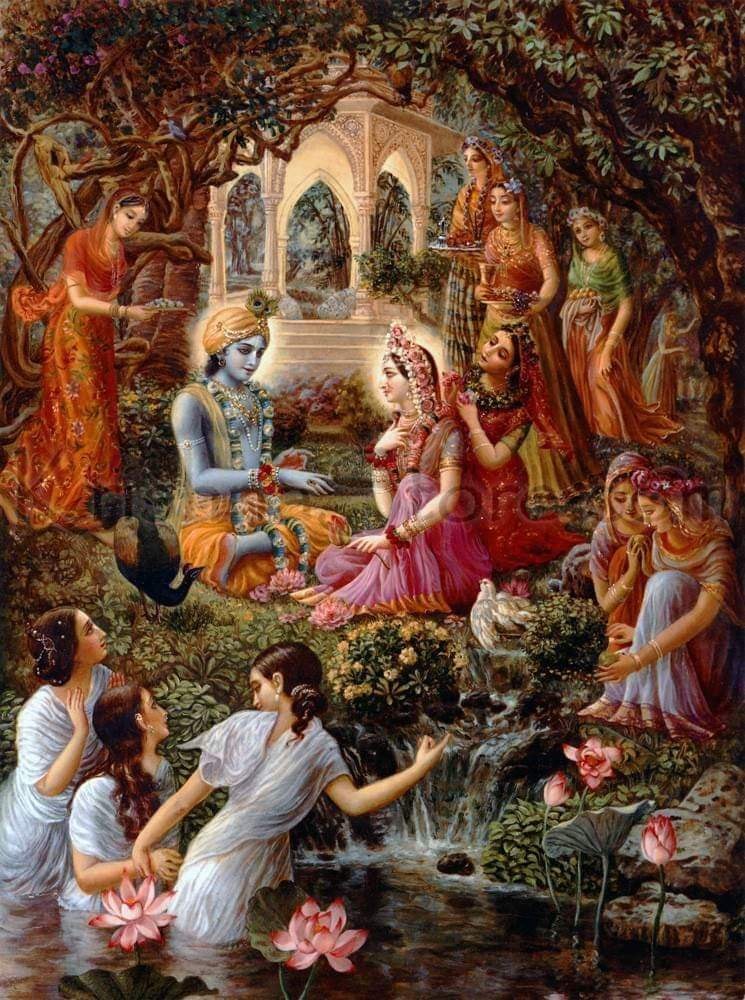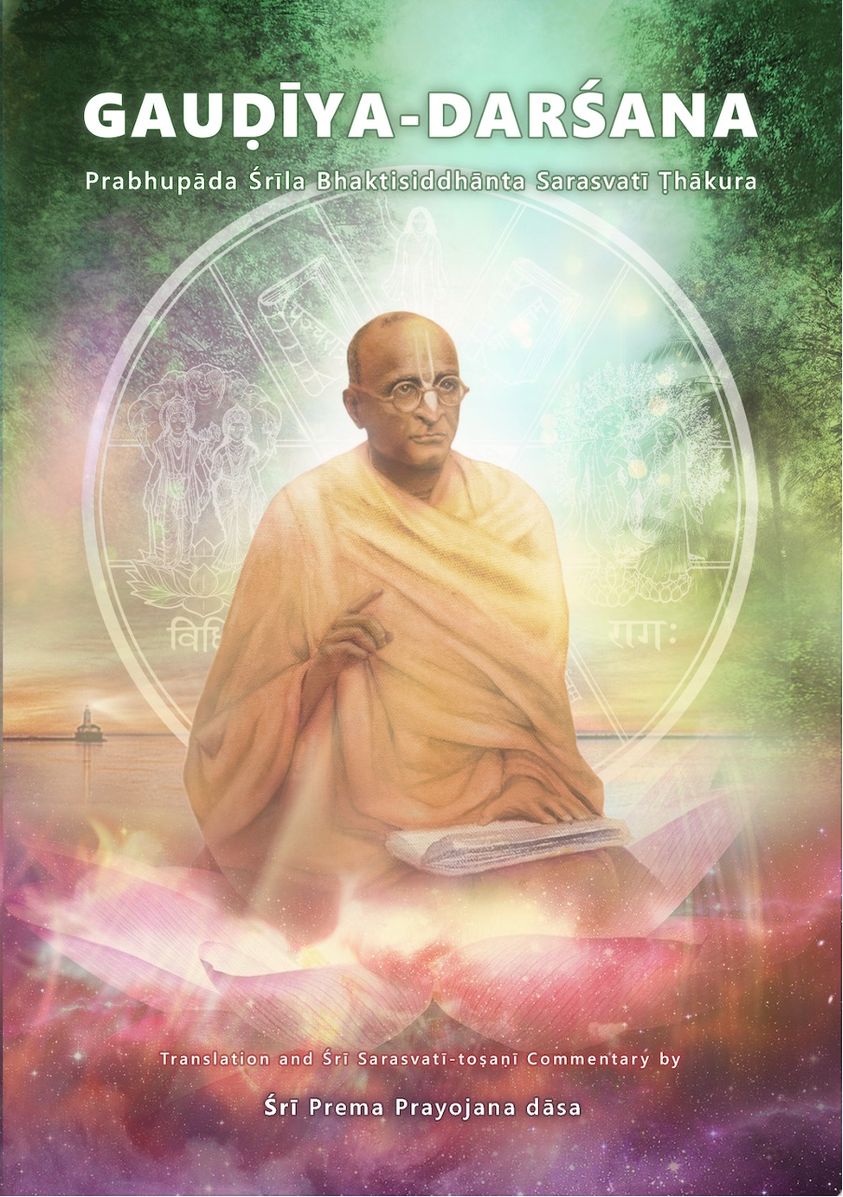Who is Śrīla Rūpa Gosvāmī?
by Śrīla Bhaktisiddhānta Sarasvatī Ṭhākura Prabhupāda
From The Rays Of The Harmonist, please see the foot note.

Question 1: Should sense-gratification and renunciation both be abandoned?
Answer: Śrī Caitanya Mahāprabhu has instructed us to abandon both sense-gratification (bhoga) and renunciation (tyāga). To take in the material sensations of form, taste, scent, sound, and touch through one’s eyes, tongue, nose, ears and skin constitutessense-gratification. Although, at first, sense-gratification may seem to be temporarily pleasing, the distress one subsequently experiences on account of it greatly outweighs the initial happiness it may provide.
This is why renunciation is more adored than sense-gratification. Renunciation is very good, but those who have adopted the process of total renunciation and have exhaustively engaged in declaring “not this, not this”, have even renounced the Supreme Lord. That kind of renunciation is in fact nothing more than another way of seeking sense-gratification.
Those who consider this world to be false and as insignificant as the stool of a crow are completely mistaken. Why? This mentality leads one to reject the existence of the creation potency of the omnipotent Supreme Lord. The material world exists in truth, but every object within it is perishable. For those who are well-versed in Vedānta, this is the only authentic philosophy.
Sense-gratification does not allow one to see the Supreme Lord’s connection to, nor His presence in, the objects of this world. Instead, by supplying an enjoyer (bhogī) with the objects for his sense-gratification dresses him up as the enjoyer (bhokta) in place of the Supreme Lord. In the same way, renunciation does not give one the chance to perceive all objects as instruments for serving the Supreme Lord. Rather, it invites one to disregard things that are related to Bhagavān.
The aggregate of all the objects of this material world comprise its opulence. The sense-objects like form, taste and so on are the predetermined objectives of the sense-organs like the eyes and so on. Therefore the senses can never be disinclined to accept their respective objects.
Hence, even when some supposedly renounced persons dress as renunciants because they have briefly controlled their senses, still, through the window of the sense of mind – which is the king of the senses – the mind can secretly remain absorbed in enjoying sense objects. And, in an attempt to attain total renunciation, if someone tries to destroy their senses, which are the very pathways to sense gratification, then before they attain true renunciation, the pain of losing their senses will inevitably fill them with great distress.
Contrastingly, a devotee neither considers material objects to be worthy of enjoying nor worthy of renouncing. Rather, they consider every object to be an instrument for serving the Supreme Lord and so they engage it in His service. The devotee is not attached to material objects, but accepts them according to his requirements in the mood of a servant who is perpetually engaged in serving the Supreme Lord.
Neither selfish enjoyment nor renunciation is an innate tendency of the soul. Rather, service is the factual, eternal occupation of the soul. The liberated soul is joyfully absorbed in serving his master in Vaikuṇṭha. And those conditioned souls who have become fortunate use neither their senses nor the objects of this material world for their own enjoyment or pleasure, nor do they selfishly renounce them. In order to be purified and delivered from their conditioned state, they engage both of these – which have been given by the Supreme Lord – in service, by accepting only those things that are favourable for service and abandoning those that are not.
Srila Rupa Goswami![Rupa-Goswami-9[1]](http://www.harekrishnasociety.com/wp-content/uploads/2012/04/Rupa-Goswami-911-207x300.jpg)
Question 2: Who is Śrīla Rūpa Gosvāmī?
Answer: Śrīla Rūpa Gosvāmī is an eternal associate of Bhagavān. He is the spiritual master of the whole world (jagad-guru) and the emperor among the devotees. In śrī kṛṣṇa-līlā, he is the maidservant of Śrīmatī Rādhikā named Śrī Rūpa Mañjarī. Śrī Rūpa Prabhu is an intimate associate of Śrī Gaurāṅga. His existence does not stem from jīva-tattva (the existential principle of the atomic living soul), but from svarūpa-śakti-tattva (the existential principle of the supreme, internal potency of reality), which is the master of jīva-tattva. He is the beloved associate of Śrī Rādhā, the daughter of Vṛṣabhānu Mahārāja.
There is a speciality of Śrī Rūpa Prabhu among the other devotees of Śrī Caitanya Mahāprabhu. He is extremely dear to Śrī Gaurāṅga-sundara. Śrīla Rūpa Prabhu knew the innermost moods of Śrī Gaurasundara’s heart to such an astounding degree that his calibre of excellence in service was not manifest in any of the other followers of Śrī Gaurāṅga serving as ācāryas in His mission. The innermost confidential moods of Śrī Gaurasundara have manifested only within the followers of Śrī Svarūpa Dāmodara and Śrī Rūpa Gosvāmī.
Everyone is indebted to Śrīla Rūpa Gosvāmī. As long as the Gauḍīya Vaiṣṇava sampradāya remains manifest in this world, no one can deny Śrīla Rūpa Gosvāmī’s extraordinary and unprecedented contribution. One’s debt to him cannot be repaid even by becoming his absolute follower.
That which is worthy of adorning the lap, chest and forehead of Śrī Kṛṣṇa, that which Śrī Kṛṣṇa bears on His shoulders and forehead at every moment, is, in truth, our eternal, worshipful Śrī Rūpa Gosvāmī Prabhu. Attaining the dust of the lotus feet of Śrī Rūpa Gosvāmī is our only ambition, and finding shelter at the lotus feet of Śrīla Rūpa Gosvāmī is our only hope and our only purpose.
How can the position of being the servant of Śrī Kṛṣṇa be attained? In answer to this question, Śrīla Kṛṣṇadāsa Kavirāja Gosvāmī has explained that only by attaining the station of servant of Śrīla Rūpa-Raghunātha can the position of being the servant of Śrī Kṛṣṇa be achieved.
The extent to which I am deprived of the lotus feet of Śrīla Rūpa Gosvāmī, my accomplishment in service is lacking. Only those in exclusive subservience to Śrīla Rūpa Gosvāmī are the rightful owners of absolute wealth. Śrīla Rūpa Gosvāmī is the epitome of kṛṣṇānuśīlanam*. From the perspective of history, he is the disciple of his elder brother Śrīla Sanātana Gosvāmī. But Śrīla Sanātana Gosvāmī also prays for the mercy of Śrīla Rūpa Gosvāmī. Śrīla Sanātana Prabhu says, “Those who do not aspire for the mercy of Śrīla Rūpa can never attain a glimpse of the beauty of service to Śrī Rādhā-Govinda.
_____________
* Perpetual, ardent endeavour meant exclusively for Śrī Kṛṣṇa. It also implies “ānukula”, “out of genuine kindness to Him”, as these words constitute the internal characteristics of the definition of uttamā-bhakti revealed by Śrīla Rūpa Gosvāmī, which begins “anyābhilāṣitā-śunyaṁ…” (Śrī Bhakti-rasāmṛta-sindhu 1.1.11)
When the karma-kāṇḍī and nirbheda-
Śrīla Rūpa and Śrīla Sanātana Gosvāmīs are Śrīman Mahāprabhu’s two commanders-in-chief. Śrīla Rūpa is the commander in chief and all his followers (rūpānugas) constitute his army. Śrī Svarūpa Dāmodara is the leader of the Gauḍīyas, and everyone will be recruited by him alone to conquer the opposing armies: the sampradāyas of anyābhilāṣī
The army of rūpānugas – that is, the followers of Śrīla Rūpa Gosvāmī – have no weapons in their hands. Their sole weapon is kīrtana. In Prayāga, Śrī Gaurasundara specially empowered the commander-in-chief Śrīla Rūpa Gosvāmī with His own potency, and taught him the methodology for organizing the movement against those sampradāyas that were opposed to bhakti. And He taught him how one can protect oneself from such unfavourable association.
By deliberating upon how the commander-in-chief fought along with his army, we too will be able to defeat the thoughts of sampradāyas that are opposed to bhakti. We will be able to defeat all such thoughts arising from asat-buddhi (mundane intelligence), phala-kāmana (
Śrīla Jiva Gosvāmī is the lion of the army of rūpanugas. He has completely refuted all false conceptions through the infallible arrows of his thoughts. The primary followers of the commander-in-chief, Śrīla Rūpa Gosvāmī, are Śrīla Jīva and Śrīla Raghunātha.
The rare treasure that Śrīla Rūpa Gosvāmī left with his primary followers can be received from Śrīla Narottama Ṭhākura and Śrīla Viśvanātha Cakravartī Ṭhākura.
If we sincerely, from the core of our heart, aspire for that priceless treasure, only then will the treasure of Śrīla Rūpa – the treasure of divine service – be attained.
When one receives Śrīla Rūpa’s beauty, sweetness, and his exceptional, transcendental and causeless amandodaya-dayā (that most auspicious and unending compassion) – the pinnacle of his mercy in all its excellence – there no longer exists any loyalty to deformity (ku-rūpa) or perversion (vi-rūpa). In fact, everything becomes extremely beautiful (su-rūpa) and appeasing to one’s spiritual eyes through the truest form of vision (sudarśana). Thereafter, the material beauty that is madly sought after by the whole world will easily be exposed as deformity worthy of spurning.
The divine form (rūpa) in which one may render service to Śrī Kṛṣṇa is presently covered by designations. One designation is the mind, the other, the body. One who becomes opposed to that divine form (rūpa) poses instead as a materialist with separate desires, another as a jñānī, and another as a yogī. Moreover, at different stages one considers, “I am a human”, or “I am a demigod”, “a scholar”, “a fool”, “rich”, “poor”, “a father”, “a son”, “a brāhmaṇa”, “a renunciant” and so on.
The beauty (rūpa) we perceive in money, in women and in recognition is desirable and tempting to us. But will we not, even once, become greedy to receive that beauty (rūpa) described by Śrī Gaurasundara’s own Śrīla Rūpa?
The lotus feet of Śrīla Rūpa Gosvāmī can be seen through eyes imbued with a mood of serving, sincere humility, and affection (prīti). Only when we make the lotus feet of Śrīla Rūpa Gosvāmī everything to us – our bhajana (transcendent, internal service), worship (pūjana), and our present and our future – will we get to see Śrī Caitanyadeva completely.
The lotus feet of Śrīla Rūpa Gosvāmī are our sole hope and aspiration. His mercy is our only support. Therefore we have this prayer –
ādadānas tṛṇaṁ dantair idaṁ yāce punaḥ punaḥ
śrīmad-rūpa-padāmbhoja-dhuliḥ syāṁ janma-janmani
Dāna Keli Cintāmaṇi (175)
by Śrī Raghunātha dāsa Gosvāmī
Clasping a straw between my teeth, I repeatedly beg to attain the dust of the lotus feet of Śrīmad Rūpa Gosvāmī, birth after birth.
Translated by the Rays of The Harmonist team
from Śrīla Prabhupādera Upadeśāmṛta
 |
Rays of The Harmonist On-line; Year 5, Issue 3, "Who is Śrīla Rūpa Gosvāmī?", by Śrīla Bhaktisiddhānta Sarasvatī Ṭhākura Prabhupāda is licensed under a Creative Commons Attribution-Share Alike 3.0 Unported License to ensure that it is always freely available. |
|
|
You may redistribute this article if you include this license and attribute it to Rays of The Harmonist. Please ask for permission before using the Rays of The Harmonist banner-logo. |
||

![mahaprabhu-btb[1]](http://www.harekrishnasociety.com/wp-content/uploads/2012/04/mahaprabhu-btb1-257x300.png)
![krsnadasa-kaviraja-goswami[1]](http://www.harekrishnasociety.com/wp-content/uploads/2012/04/krsnadasa-kaviraja-goswami11.jpg)
![Radha--Govinda[1]](http://www.harekrishnasociety.com/wp-content/uploads/2012/04/Radha-Govinda1-213x300.jpg)
![15[1]](http://www.harekrishnasociety.com/wp-content/uploads/2012/04/151-300x206.jpg)
 Posted in
Posted in 








